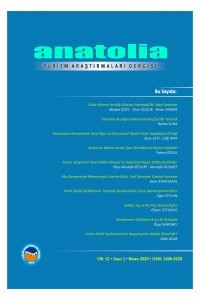There is no time limitation for submission to Anatolia: Journal of Tourism Research. Authors are welcomed to submit their papers at any date or period in a year.
Anatolia: Journal of Tourism Research started its publication activities in January 1990 under the name “Anatolia: Journal of Tourism and Environment”. The journal includes theoretical, conceptual, empirical, and applied studies in the tourism field of tourism in Turkiye. The journal was published as a periodical with academic content between the years 1990 – 1997. The publication as a peer-reviewed journal started in 1997. The journal accepts academic papers on tourism and related subjects such as accommodation/hospitality, travel, and food and beverage management.
Each submitted paper is undertaken in a peer-review process by minimum two academic referees in the relevant field. The Statistics Editor may also be involved when deemed necessary. Authors are expected to respect "Publishing and Writing Rules” before submitting their manuscripts to the journal. In addition to academic research papers, Anatolia also includes various sections namely Research Notes on Recreation, Gastronomy, Tourism History, Tour Guiding and Selected Translation Articles, Conference Notes, and Tourism Research Projects which are edited by the academic experts in the relevant fields.
2024 - Volume: 35 Issue: 2
Anatolia Tourism Academy
- Türkiye Tourism Encyclopedia
- Conference for Graduate Research on Tourism
- International Tourism Cartoons Competition
- Turkish Tourism History Platform
- Anatolian Cuisine Photograph Competition
- Anatolia: An International Journal of Tourism and Hospitality Research
- World Conference for Graduate Research in Tourism, Hospitality & Leisure
- Interdisciplinary Tourism Research
- Academic Tourism Bulletin
- Search Conference for Academic Tourism Education
- Anatolia Academy Conferences
- Anatolia Tourism Education Recognition Awards
- Anatolia International Recognition Awards
- Conference for Recreation Research
- Pioneering Researchers and Educators of Turkish Tourism


